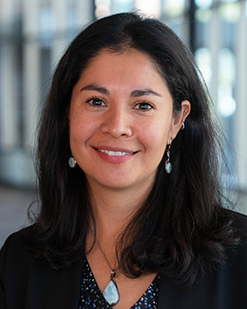Cristina Penaranda, PhD

Special Interests
Our lab studies host-pathogen interactions with the goal of defining host and bacterial pathways involved in bacterial persistence. Bacterial interactions with the host involve dynamic exchanges where heterogeneity from both sides can lead to many different outcomes. Persistence occurs when the pathogen evades the host immune response and the host is unable to clear the invading pathogen, resulting in stable bacterial colonization. Individuals with persistent infections often do not respond to long-term or repeated appropriate antibiotic treatment and, importantly, serve as reservoirs for the development of antibiotic resistance. We do not understand why certain infections progress to persistence while others do not. Moreover, the host pathways that lead to persistence have remained an under explored area of investigation. We hypothesize that bacterial persistence within a host is the result of a complex interplay of specific host and pathogen molecular pathways and that understanding these pathways will allow harnessing host immunity to shift the balance from persistence to clearance of infections. Our lab utilizes transcriptional analysis at the single cell level and functional perturbations of both the host and the pathogen to understand how persistence is established and maintained.
Education
Education
- 2005 - 2010
- University of California, San Francisco , PhD in Immunology
- 2000 - 2004
- Ohio University, Athens, OH, BS in Biological Sciences
Fellowship
- 2012 - 2018
- Massachusetts General Hospital and Broad Institute, Boston, MA, Post-doctoral fellow
Awards & Recognition
2005 -2010: National Institute for General Medical Sciences (NIGMS) fellow
Publications
Penaranda C, Chumbler NM, Hung DT. (2021) Dual transcriptional analysis reveals adaptation of host and pathogen to intracellular survival of Pseudomonas aeruginosa associated with urinary tract infection. PLOS Pathogens. 17(4): e1009534.
Betin V*, Penaranda C*#, Bandyopadhyay N, Yang R, Abitua A, Bhattacharyya RP, Fan A, Avraham R, Livny J, Shoresh N, Hung DT#. (2019) Hybridization-based capture of pathogen mRNA enables paired host-pathogen transcriptional analysis. Sci Rep. 9, 19244.
*Co-first author #Co-corresponding author
Avraham R, Haseley N, Brown D, Penaranda C, Jijon HB, Trombetta JJ, Satija R, Shalek AK, Xavier R, Regev A, Hung DT. (2015) Pathogen cell-to-cell variability drives heterogeneity in host immune responses. Cell. 162(6):1309-21.
Kuswanto W, Hofmann J, Kenefeck R, Narendran P, Walker LSK, Bluestone JA, Abbas AK, Dooms H. (2012) Interleukin-7 promotes autoimmune diabetes by suppressing PD-1 mediated inhibition of effector/memory T cells. Proc Natl Acad Sci. 109: 12668-12673.
Penaranda C, Tang Q, Bluestone JA. (2011) Anti-CD3 therapy promotes tolerance by selectively depleting pathogenic cells while preserving regulatory T cells. J Immunol. 187:2015-22.
Academic Affiliations
Department of Immunology & Microbiology, University of Colorado-Denver Anschutz Medical Campus
